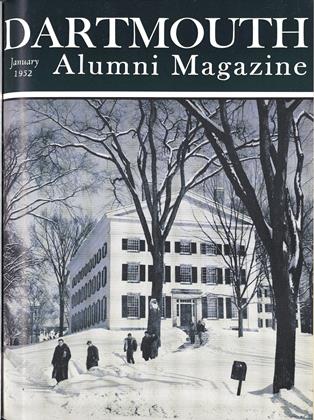byHerrymon Maurer '35, Henry RegneryCompany, 1951, 352 pp., $4.50.
Events in the Far East during the past five years have revealed the woeful inadequacy an- inconsistency of American foreign policy decisions in that part of the world. How did we get into the mess we are in now? Who is to blame for it?
Mr. Maurer answers these questions in his excellent historical and psychological study of the abject failure of Western statesmen to understand the essence of the clash of Eastern and Western cultures in Asia during the period 1937-1947. The present plight of China and Korea illustrates the tragic consequences of their failure to grasp the situation.
The author believes that the one great mistake which turned the cultural meeting of East and West into an intense cultural collision was "the mistake of treating Eastern peoples not straightforwardly as persons who are valuable in themselves but rather as units of population which can be used as means to some greater end: the reform of governments and the conduct of trade, the procedures of war and diplomacy.... It was assumed, for instance, that it was to the advantage of China to be treated not simply as a country in itself, as a country of special needs, sufferings, and hungers, but as an adjunct to the American war effort and to the American plan for peace, which for some years centered on the hope of Russo-American cooperation." The situation will not improve, Mr. Maurer feels, until more people come to realize that "the use of other persons or other peoples as devices to make oneself feel superior provokes hostility and leads to emotional or cultural collision."
Like Ruth Benedict's The Chrysanthemumand the Sword (Boston, 1946) Herrymon Maurer's fine book should be required reading for all students of Far Eastern history and culture.
 View Full Issue
View Full Issue
More From This Issue
-
 Article
ArticleTwo Sides to Science
January 1952 By WILLIAM W. BALLARD '28 -
 Class Notes
Class Notes1918
January 1952 By ERNEST H. EARLEY, DONALD L. BARR, RICHARD P. WHITE -
 Article
ArticleTHE COLLEGE
January 1952 By JOHN HURD '21 -
 Class Notes
Class Notes1929
January 1952 By F. WILLIAM ANDRES, EDWIN C. CHINLUND, JACK D. GUNTHER -
 Article
ArticleConcerning the Princeton Game
January 1952 By C.E.W. -
 Article
ArticleAllan Macdonald
January 1952 By ARTHUR E. JENSEN
Books
-
 Books
BooksBriefly Noted
JULY 1966 -
 Books
BooksGOETHE AND MUSIC.
April 1955 By FRANK G. RYDER -
 Books
BooksTHE WINOOSKI,
June 1949 By Herbert F. West '22 -
 Books
BooksNOW IS THE MOMENT,
October 1943 By John G Gazley -
 Books
BooksAMERICAN HEROINE: THE LIFE AND LEGEND OF JANE ADDAMS
October 1973 By ROBERT E. RIEGEL -
 Books
BooksVITAL PROBLEMS OF CATHOLIC EDUCATION IN THE UNITED
April 1940 By William F. Geiger '92.


